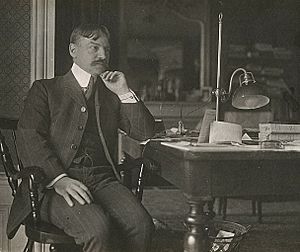Julien Benda facts for kids
Quick facts for kids
Julien Benda
|
|
|---|---|
 |
|
| Born | 26 December 1867 Paris |
| Died | 7 June 1956 (aged 88) Fontenay-aux-Roses |
| Occupation | Philosopher, writer, critic |
| Works | La Trahison des Clercs |
| Awards |
|
Julien Benda (born December 26, 1867 – died June 7, 1956) was a French thinker and writer. He was known for his essays and for looking closely at culture. His most famous book is La Trahison des Clercs from 1927. This title means The Treason of the Intellectuals or The Betrayal by the Intellectuals.
Contents
Life of Julien Benda
Julien Benda was born in Paris, France. He came from a Jewish family but grew up without a strong religious background. He went to a famous school called Lycée Louis-le-Grand. Later, he studied history at the Sorbonne, finishing in 1894.
When his father passed away in 1889, Benda became financially independent. This meant he had enough money to live on his own. He wrote for a magazine called La Revue Blanche for many years. His articles about the Dreyfus affair, a big political scandal in France, were later put into a book called Dialogues.
Benda often disagreed with other famous thinkers. He strongly criticized Henri Bergson, who was a very popular French philosopher at the time. Benda even wrote an attack on Bergson in 1911.
In 1937, Benda went to a meeting called the Second International Writers' Congress. Writers from all over the world attended. They met to talk about how thinkers should view the Spanish Civil War. Many famous writers like Ernest Hemingway were there.
Julien Benda lived through the German occupation of France during World War II. He also lived under the Vichy regime, which was the government that worked with Germany. He stayed in a town called Carcassonne. A writer named Jean Guéhenno wrote about Benda's time there. He described Benda as "Unbearable, yet likeable." Benda passed away in Fontenay-aux-Roses in 1956, at 88 years old.
Julien Benda's Writings
Julien Benda is mostly known for his essays. Essays are short pieces of writing that explore a topic or argument. He was nominated four times for the Nobel Prize in Literature. This is a very important award for writers.
He was also nominated for the Goncourt Prize in 1912. This was for his book L'Ordination. However, he did not win. The vote was tied, and another writer, André Savignon, won instead. This election was quite famous because it caused the head of the Académie Goncourt to step down.
The Treason of the Intellectuals
Benda is best remembered for his short book from 1927, La Trahison des Clercs. The English title is The Treason of the Intellectuals. This book had a big impact. In it, Benda argued that many European intellectuals (smart people who think deeply about society) in the 1800s and 1900s had lost their way.
He believed they stopped thinking clearly and fairly about politics and war. Instead, they started supporting strong nationalism, which is extreme pride in one's own country. They also supported war and racism. Benda was especially critical of French writers like Charles Maurras and Maurice Barrès.
Benda believed in the calm and fair way of thinking from classical civilization. He also liked the idea of people from different countries working together, which was part of traditional Christianity.
At the end of his book, Benda made a sad prediction. He worried that people's desire to control the world would grow too strong. He thought this could lead to a world where the only goal was power. He wrote bitterly, "And History will smile to think that this is the species for which Socrates and Jesus Christ died." This meant he felt humanity was losing its way, despite the teachings of great figures.
Other Works by Benda
Julien Benda wrote other important books too. These include Belphégor (1918) and Uriel's Report (1926). He also wrote Exercises of a Man Buried Alive (1947). This last book was a criticism of famous French people of his time. Most of Benda's books were published later in his life, making him mainly a 20th-century author.
In his 1933 book Discours à la nation européenne, Benda wrote a response to Johann Gottlieb Fichte's Addresses to the German Nation.
See also
 In Spanish: Julien Benda para niños
In Spanish: Julien Benda para niños
- Notes on Nationalism, a 1945 essay by George Orwell that talks about ideas similar to Benda's Trahison des Clercs.
 | Frances Mary Albrier |
 | Whitney Young |
 | Muhammad Ali |

